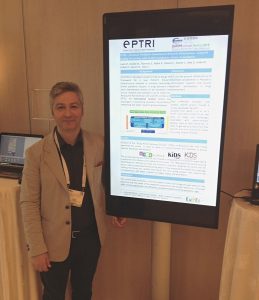 The EUFEPS (European Federation for Pharmaceutical Sciences) has organized its Annual Meeting on May 24-26th in Athens.
The EUFEPS (European Federation for Pharmaceutical Sciences) has organized its Annual Meeting on May 24-26th in Athens.
This year’s edition was dedicated to the theme Crossing Barriers for Future Medicines and covered some interesting topics such as the basic research in oral and mucosal drug absorption and transport to innovative medicines and their PK/PD evaluation.
In this occasion, EPTRI has been selected to present the following two posters:
- “European Paediatric Translational Research Infrastructure – A new RI leading the turning point in the Formulation Science in paediatrics”;
- “EPTRI – European Paediatric Translational Research Infrastructure. Mapping the research units active in the field of paediatrics in the EU
The first poster, presented by Nunzio Denora, from the Università degli Studi di Bari. was focused on the “Paediatric Device survey“ developed by EuPFI on the ease of usage and challenges associated with administration devices used to take medicines in order to get advice directly from the patients and their families to make the survey children-friendly. This survey has been reviewed by the children of the “Young Person Advisory Groups” (YPAGs) of Barcelona, Bari and Tirana, in order to make it children-friendly.
The second poster was presented by Emmanuel Mikros from Athena research and innovation center in information communication & knowledge technologies and was focused on the survey launched in the framework of the EPTRI project to identify the potential service providers to be included in the future Research Infrastructure. In this way, EPTRI will network all the available competences and technologies useful to the paediatric research, creating an open science space allowing top-level researchers to work together in order to lead drug development for the pediatric population.
The EUFEPS Annual Meeting is organized in alliance with Prof. Panos Macheras from ATHENA, leader of EPTRI’s Work Package 5. This group is in charge of designing a thematic platform about early paediatric drug discovery.
